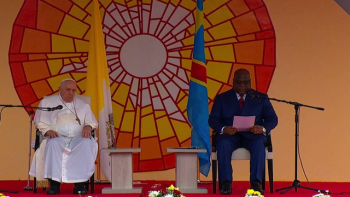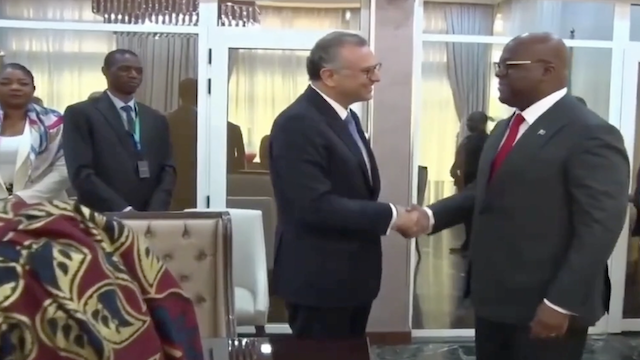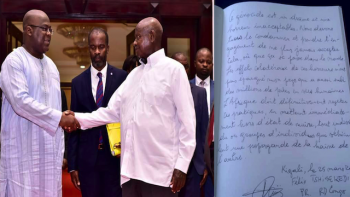This year, some African dictators were deposed or killed. Those deposed include Malian President Ibrahim Boubacar Keïta and Guinean President Alpha Condé. Chadian President Idriss Déby was killed. Meanwhile, many African dictators remain in power, including some already featured among AfroAmerica Network African ruthless dictators of 2018 (see AfroAmerica Network African Dictators Who Mattered In 2018: Congolese Joseph Kabila, Rwandan Paul Kagame, Ugandan Yoweri Museveni of Dec 27, 2018). New dictators are also joining the ranks.
Guinea Conakry: Coup after Coup.
Mali: Coup after Coup.
Tchad: A Dictator Killed and Replaced by His Son.
In April 2021, Chad’s long time ruling dictator Idriss Déby, addressed as Marshal Idriss Déby Itno, was killed following intense fighting against rebels. He was replaced by his 37-year-old son, General Mahamat Idriss Déby Itno (see African Dictators, Sons, and Daughters: Chad Dictator Idriss Deby Killed and Replaced by His son).
Idriss Déby had ruled Chad for more that 30 years, after seizing power in a coup in December 1990, as a leader of a rebellion against the dictator Hissène Habré. He survived various rebellions and coup attempts against his own rule. He won elections in 1996 and 2001. He then eliminated term limits in the constitution, which allowed him to claim the elections in 2006, 2011, 2016, and 2021. In 2020, he gave himself the title of Marshal.
African Dictators Who Matter.
Advertisement
... ON AMAZON AND BARNES NOBLE-- CLICK HERE
For more on Legs of Tornado: The Human Who Outran the Wind, Visit the site Legs of Tornado, here
The Guinean dictator Alpha Condé and Tchadian dictator Idriss Déby had changed their countries’ constitutions to allow them to run for additional illegal terms. Their actions are a reminder of what most dictators across Africa have been doing.
Among the most ruthless African dictators are:
- Yoweri Museveni of Uganda, 76, born in 1944 and dictator since 1986. When he overthrew another dictator in 1986, he promised to leave power in 1990, then in 1996, then in 2001, then in 2006, then in 2011, then in 2015, then never. In 2000, he told Los Angeles Times: "I will leave office, for sure, because I am not a hereditary king. I would be very glad to leave office, once I have served my term. To be remembered, just as a freedom fighter, who helped to give the people of Uganda a key to their future, to give them democracy, get rid of the dictatorship." Well, he not only remains the dictator of Uganda but also, on December 27, 2017, he amended the Constitution to remove the presidential age limit caps, allowing himlself to remain in power for life. Since then, he has been accused of wide repession against the opposition (see Ugandan Dictator Yoweri Museveni Tells Media Reasons for Clinging on Power: Ugandans are Fools and Without Direction and Western Media is Ignorant and Arrogant). Yoweri Museveni has, allegedly, been grooming his son, General Muhoozi Kainerugaba, as the successor.
- Paul Kagame of Rwanda, 63, and dictator since 1994. Paul Kagame often talks about tolerance, openeness, reconciliation, and giving power to the Rwandan people but, for now, he is mostly known for his authoritarian streak and an impressive record of bloody repression and massive systematic crimes both inside Rwanda and in neighboring countries, since 1990. Initially claiming to be ready to release power, Paul Kagame, in 2015, when his second term allowed by the constitution progressed, decided to rewrite the term-limit clause of the Rwandan constitution, to allow him to run for a third term in the 2017 elections and remain in power for life. Paul Kagame has, allegedly, been grooming his daughter, Ange Kagame, as his successor (see Ailing Rwandan Paul Kagame's Attempts to Cling to Power Through His Daughter Ange Kagame
- Paul Biya of Cameroon, 91, born in 1933 and dictator since 1982. Initially a promising bright and visionaly democratic leader, he has now turned into a senile dictator, awaiting to leave power only by death.
- Denis Sassou Nguesso of the Republic of Congo, 77, born in 1943 and dictator between 1979-1990 and then since 1997. He was forced to give up power in 1990 and then led a bloody civil war to retake power in 1997. His nepotism is known around the World (see Kleptocrat Dictators and Sons: US vs. Denis Christel Sassou-Nguesso)
- Teodoro Obiang Nguema Mbasogo of Equatorial Guinea, 79, born in 1942 and dictator since 1979. He is one of the most corrupt leaders in Africa. Yet, he overthrew his uncle Macías, after the latter ordered the murders of several members of their relatives, including Obiang's brother. Obiang and others in Macías' inner circle feared the president had become insane. Obiang overthrew his uncle on 3 August 1979 in a bloody coup, tried him for genocide and executed him by a firing squad on 29 September 1979. Since then, he has become the copy of his uncle, with the sole difference that he has pushed nepotism to the extreme (see African Kleptocrat Dictators: Like the US, the European Union Steps Up Investigation Efforts)
- Ali Bongo Ondimba of Gabon, 62, born in 1959 and dictator since 2009. After being groomed by his father for years, he took over power after his father died. Since then, he has held onto power with an iron grip. However, he has rarely been seen in public over the recent couple of years, and on accasion, with signs of deteriorating health. He is believed to mostly spend time in hospitals outside the country and slowly appointing, to high positions, people who will protect interests of his relatives and his and his later father Omar Bongo's legacy after him. (see Gabon: Rose Christiane Raponda, First Woman Appointed Prime Minister)
- Faure Essozimna Gnassingbé Eyadéma, 55, born in 1966 and dictator since 2005. After being groomed by his father Gnassingbé Eyadéma, he became president after his father's death in 2005. Gnassignbé Eyadéma became the president of Togo from 1967 until his death in 2005. He rised to the presidency after two successful military coups, in January 1963 and January 1967, and became president on 14 April 1967. During the presidency, Gnassignbé Eyadéma prepared his son to be the successor to the presidency. Hence, Faure Essozimna Gnassingbé Eyadéma was appointed by his father as Minister of Equipment, Mines, Posts, and Telecommunications, serving from 2003 to 2005. In 2002, the constitution was ammended to lower the eligibility age for the presidency from 40 to 35 to match the age of Faure Essozimna Gnassingbé Eyadéma, then 36.
- Alassane Ouattara of Ivory Coast, 79, born in 1942 and dictator since 2011. Alassane Ouattara forced a third term last year after illegally changing his country’s constitution. His attempts to change the constitution and the country legal provisions started early, even before he became president. In fact serving as Prime Minister, under Houphouët-Boigny, Alassane Ouattara unsuccessfully tried, illegally and against the constitution, to carry out presidential duties for a total of 18 months, when Houphouët-Boigny was ill. When Houphouët-Boigny died on 7 December 1993, a power struggle ensued between Alassane Ouattara and the then President of the National Assembly Henri Konan Bédié, over the presidential succession in total disregard for the constitution that clearly gave Henri Konan Bedié the legal right to lead the country if Houphouet became unfit. Konan Bédié prevailed: Alassane Ouattara resigned as Prime Minister in December 1993 . When he became president in 2010, following controversial elections marred with irregulalities, unrests, a civil war, and arrests of opponents, he clearly was determined to keep himself in power, forever.
What is Next for African Dictators.
One lesson for African dictators may be the one in Sudan. On April 11, 2019, Sudan dictator Omar Hassan Ahmad al-Bashir was removed from power by the military after months of anti-government protests against his three-decade rule. Women played a major role in his removal from office. Since then, Omar Hassan Ahmad al-Bashir has been facing charges of genocide, war crimes and crimes against humanity in Darfur. The new Sudanese government has committed to hand Omar al-Bashir over to the International Criminal Court (ICC) along with other officials wanted over the crimes in Darfur, according to a Cabinet of Ministers.
©2021 AfroAmerica Network.


















